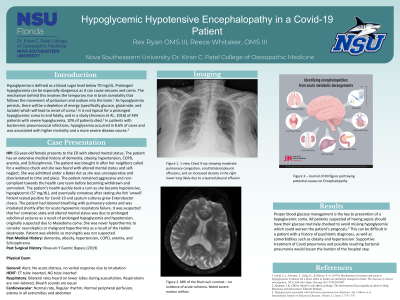Back

Clinical: General Topics
Hypoglycemic Hypotensive Encephalopathy in a Covid-19 Patient
Friday, March 31, 2023
12:00 PM East Coast USA Time

- RR
Rex Ryan, n/a
OMS-III
Nova Southeastern University Dr. Kiran C. Patel College of Osteopathic Medicine
Ocala, Florida, United States
Presenting Author(s)
Introduction: A 63-year-old female presents to the ED with altered mental status. The patient has an extensive medical history of dementia, obesity, hypertension, COPD, anemia, and Schizophrenia. The patient was brought in after her neighbors called for a wellness check and she was found with altered mental status and self-neglect. She was admitted under a Baker Act as she was uncooperative and disorientated to time and place. The patient remained aggressive and non-compliant towards the health care team before becoming withdrawn and somnolent. The patient’s health quickly took a turn as she became hypotensive, hypoglycemic (57 mg/dL), and eventually comatose after stating she felt ‘unwell’. Patient tested positive for Covid-19 and sputum cultures grew Enterobacter cloaca. The patient had labored breathing with pulmonary edema and was intubated shortly after for acute hypoxemic respiratory failure. It was suspected that her comatose state and altered mental status was due to prolonged subclinical seizures as a result of prolonged hypoglycemia and hypotension, originally suspected due to Myxedema coma. She was never hyperthermic to consider neuroleptics or malignant hyperthermia as a result of the Haldol-decanoate. Patient was afebrile so meningitis was not suspected.
Case Study: Hypoglycemia is defined as a blood sugar level below 70 mg/dL. Prolonged hypoglycemia can be especially dangerous as it can cause seizures and coma. The mechanism behind this involves the temporary rise in brain osmolality that follows the movement of potassium and sodium into the brain. As hypoglycemia persists, there will be a depletion of energy (specifically glucose, glutamate, and lactate) which will lead to onset of coma. It is not typical for a prolonged hypoglycemic coma to end fatally, and in a study (Aronson et Al., 2016) of 494 patients with severe hypoglycemia, 10% of patients died. In patients with bacteremic pneumococcal infections, hypoglycemia occurred in 8.6% of cases and was associated with higher mortality and a more severe disease course.
Discussion: Proper blood glucose management is the key to prevention of a hypoglycemic coma. All patients suspected of having sepsis should have their glucose routinely checked to avoid missing hypoglycemia which could worsen the patient’s prognosis. This can be difficult in a patient with a history of psychiatric diagnoses, as well as comorbidities such as obesity and hypertension. Supportive treatment of Covid pneumonia and possible resulting bacterial pneumonia would lessen the burden of the hospital stay.
Case Study: Hypoglycemia is defined as a blood sugar level below 70 mg/dL. Prolonged hypoglycemia can be especially dangerous as it can cause seizures and coma. The mechanism behind this involves the temporary rise in brain osmolality that follows the movement of potassium and sodium into the brain. As hypoglycemia persists, there will be a depletion of energy (specifically glucose, glutamate, and lactate) which will lead to onset of coma. It is not typical for a prolonged hypoglycemic coma to end fatally, and in a study (Aronson et Al., 2016) of 494 patients with severe hypoglycemia, 10% of patients died. In patients with bacteremic pneumococcal infections, hypoglycemia occurred in 8.6% of cases and was associated with higher mortality and a more severe disease course.
Discussion: Proper blood glucose management is the key to prevention of a hypoglycemic coma. All patients suspected of having sepsis should have their glucose routinely checked to avoid missing hypoglycemia which could worsen the patient’s prognosis. This can be difficult in a patient with a history of psychiatric diagnoses, as well as comorbidities such as obesity and hypertension. Supportive treatment of Covid pneumonia and possible resulting bacterial pneumonia would lessen the burden of the hospital stay.
